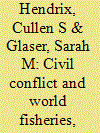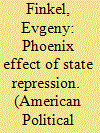| Srl | Item |
| 1 |
ID:
109913


|
|
|
|
|
| Publication |
2011.
|
| Summary/Abstract |
While the negative economic consequences of civil conflict are well known, does civil conflict have sector-specific effects that threaten food and economic security? This article surveys the effects of civil conflict on reported marine and inland fish catch, focusing on the effects of conflict through redeployment of labor, population displacement, counter-insurgency strategy and tactics, and third-party encroachment into territorial waters. Analysis of 123 countries from 1952 to 2004 demonstrates a strong, statistically robust and negative relationship between civil conflict and fisheries, with civil wars (1000+ battle deaths) depressing catch by over 16% relative to prewar levels. The magnitude of this effect is large: the cumulative contraction in total fish catch associated with civil war onset is roughly 13 times larger than the estimated effect of an extraordinarily strong El Niño, the ocean-atmosphere phenomenon associated with global declines in fisheries. Robust evidence of a Phoenix effect is lacking: post-conflict fisheries do not quickly bounce back to prewar catch levels due to more rapid growth. Analysis of conflict episodes indicates that conflict intensity, measured by battle deaths, negatively affects fish catch, while population displacement and conflict proximity to the coast do not. While these findings contribute to the growing literature on the economic effects of civil conflict, they also are important for regional fisheries management organizations, which must increasingly pay attention to sociopolitical factors that dramatically affect the utilization of aquatic resources.
|
|
|
|
|
|
|
|
|
|
|
|
|
|
|
|
| 2 |
ID:
140176


|
|
|
|
|
| Summary/Abstract |
Why are some nascent groups able to organize sustained violent resistance to state repression, whereas others quickly fail? This article links the sustainability of armed resistance to a largely understudied variable—the skills to mount such a resistance. It also argues that the nature of repression experienced by a community creates and shapes these crucial skills. More specifically, the article focuses on a distinction between selective and indiscriminate state repression. Selective repression is more likely to create skilled resisters; indiscriminate repression substantially less so. Thus, large-scale repression that begins at time t has a higher chance of being met with sustained organized resistance at t +1 if among the targeted population there are people who were subject to selective repression at t‒1. The article tests this argument by comparing the trajectories of anti-Nazi Jewish resistance groups in three ghettos during the Holocaust: Minsk, Kraków, and Białystok.
|
|
|
|
|
|
|
|
|
|
|
|
|
|
|
|